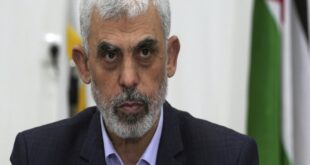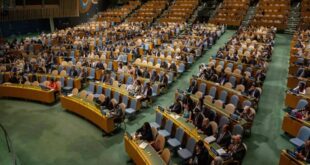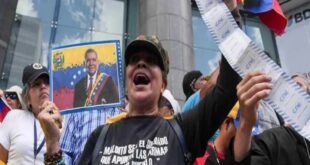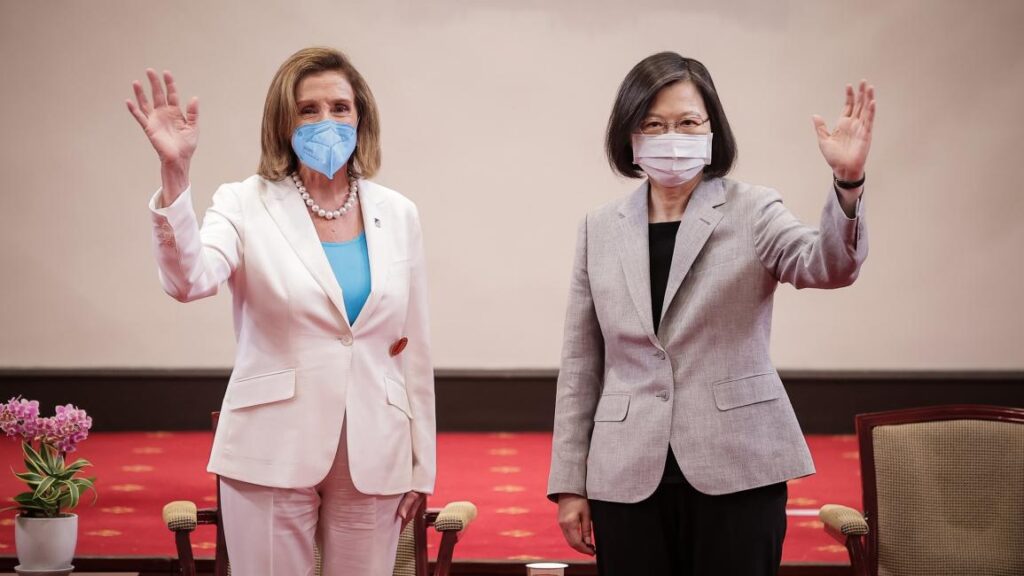
But the US House speaker’s provocative move will likely mark the opening salvo in a long and increasingly perilous struggle for the future of the island.
After weeks of intense speculation and sabre-rattling, Nancy Pelosi, the speaker of the United States House of Representatives, is reportedly set to visit the self-ruled island of Taiwan. The top US legislator did not put Taiwan in her official Asia tour itinerary, which kickstarted with visits to Singapore and Malaysia.
Recent reports suggest that Pelosi will visit Taiwan before heading to Northeast Asia, but the duration and nature of her visit are still a mystery. No one knows for sure whether the speaker will meet with Taiwanese President Tsai Ing-wen or any other top local official as other senior US officials did during their recent visits to the island.
The last time a US House speaker visited Taipei was in 1997, when Representative Newt Gingrich sought to show solidarity and support for the self-ruling democracy following the 1995-1996 Taiwan Strait Crisis, which saw both Washington and Beijing flexing military muscle in the area. This time, Pelosi will be visiting the island amid an ongoing conflict in Ukraine, which has drawn many ominous comparisons with the situation in Taiwan.
Many fear that the US House speaker’s visit will exacerbate the crisis. After all, China considers the self-ruling island a “renegade province” that should eventually be fully reintegrated into the mainland. And the Asian powerhouse is increasingly worried about Washington’s expanding diplomatic and military support to Taiwan.
On July 25, China’s foreign ministry warned that a potential visit by Pelosi would result in “serious consequences” for which the US would need to assume full responsibility. A few days later, on July 28, in a much-anticipated phone conversation with US President Joseph Biden, China’s paramount leader Xi Jinping repeated the warning, and cautioned Washington against “play[ing] with fire”. Just yesterday, China’s ambassador to the United Nations, Zhang Jun, yet again described Pelosi’s expected visit as “dangerous” and “provocative”, and said it will be met with “firm and strong measures to safeguard our national sovereignty and territorial integrity”. Accordingly, both the US and Chinese armed forces have taken preparatory measures ahead of the visit.
Now there are growing worries that in the coming days and weeks we may see a significant escalation in the ongoing rivalry between the US and China, with several commentators warning that the House speaker’s visit may even trigger a large-scale military confrontation.
So how did the situation get here, and what could be the immediate and long-term consequences of Pelosi’s expected visit to the island?
Frozen conflict
Taiwanese scholar Hsiao-ting Lin has aptly described his country as an “accidental state”, which is less “the result of deliberate forethought and planning” by major protagonists than “the outcome of many ad hoc, individualistic factors and decisions related to war or alliance maintenance, or even serendipity”.
Once home to Austronesian peoples, and later divided among various European powers and Chinese dynasties, the island of Taiwan was occupied by Imperial Japan in the late 19th century following the First Sino-Japanese War. In contrast to Tokyo’s brutal occupation of Korea and many other Southeast Asian nations over the next few decades, its colonisation of Taiwan was, in the words of one historian, “relatively orderly, peaceful and productive”.
The upshot of the “orderly” occupation was the establishment of a modern state with relatively high levels of economic and educational standards. The end of World War II saw the withdrawal of Japanese forces from Taiwan. But it was not the exit of Japanese forces but the civil war between communist and nationalist forces in mainland China that made Taiwan what it is today. After a series of major defeats at the hand of Maoist forces, the Kuomintang (KMT), led by Chiang Kai-shek, retreated to the island.
At this exact point, the US entered the picture by deploying the Seventh Fleet of the US Navy to the region in defence of KMT forces. The presence of US troops in the area effectively froze the conflict and prevented the CCP from chasing its rivals and occupying Taiwan. On multiple occasions, Beijing and Taipei almost came to blows, but the US intervention, most dramatically through the deployment of multiple aircraft carriers to the Taiwan Strait in the mid-1990s, proved decisive in maintaining a fragile status quo.
Shifting sands
Although the US, since the early 1970s, has had a “one China” policy which recognises Beijing as the sole official representative of both the mainland and Taiwan, successive US governments maintained robust defence and diplomatic ties with the self-ruling island under the Taiwan Relations Act.
In exchange for its support, Washington expected Taipei to refrain from provocative actions, including a declaration of formal independence from mainland China. The so-called “1992 Consensus”, whereby both Taipei and Beijing recognised that there is ultimately one China without clarifying under whose rule, represented a major step towards peace-building.
Some Taiwanese leaders such as President Ma Ying-jeou went a step further by rapidly expanding diplomatic and economic ties with China. At times, both parties even discussed the possibility of peaceful Taiwanese incorporation into China based on the “one country, two systems” model governing Hong Kong.
But tectonic shifts in domestic political alignments and regional balance of power have unleashed a perilous dynamic in the Taiwan Straits. On one hand, China has become more assertive in its foreign policy, especially since the ascent of Xi Jinping, who has vowed to bring about “the great rejuvenation of the Chinese nation” and pursue the “China dream” of turning his nation into a global superpower.
To this end, Xi has made it clear that he will employ “all necessary means” to reincorporate Taiwan into China and safeguard his country’s territorial claims in the region. Under his watch, China has rapidly developed its conventional and asymmetric military capabilities, dramatically undermining America’s military primacy in the region.
Meanwhile, indigenous nationalism and pro-independence sentiments have been gaining momentum in Taiwan. Back in the mid-1990s, more than half of Taiwanese residents identified as both “Chinese and Taiwanese”. In 2020, a Pew Research Center survey showed that only four percent saw themselves as Chinese, with as many as two-thirds of the population self-identifying as purely “Taiwanese”. Furthermore, the pro-independence Democratic Progressive Party (DPP), from which President Tsai hails, has become the dominant political force in the country, managing to win both the presidential and parliamentary elections in 2016.
Reasserting leadership
In China, fears are deepening that Taiwan is drifting away from the mainland despite the growing economic and social interdependence witnessed under Xi. This is why in recent years there has been an uptick in Beijing’s efforts to intimidate Taipei, including massive drills in the Taiwan Strait, open threats of military invasion and increased deployment of fighter jets into Taiwanese airspace.
Meanwhile, eager to reassert its regional leadership and reassure allies across Asia, the US has moved to deepen its diplomatic and military ties with Taipei, which is becoming ever more important to the West as a leading global semiconductor producer.
The US Congress has recently approved several packages of massive arms exports to Taiwan, while high-level US officials, including a cabinet member and several legislators, have visited the self-ruling island. Bilateral military exercises, now involving even US special forces, have also picked up accordingly.
Pelosi’s expected visit to Taipei will mark the latest and most high-profile visit yet by a top American official. Following intense conversations with his Chinese counterparts, Biden has expressed his reservations about the planned trip. And yet, the US president himself asserted, on multiple occasions, that America has a mutual-defence obligation to Taiwan in the event of a conflict with China, even if such assurances aren’t expressly mentioned in the more generically-worded Taiwan Relations Act.
Sensing growing bipartisan support for Taiwan, the Biden administration has begun to be more supportive of Pelosi’s visit, with National Security Council spokesperson, John Kirby warning China against “turn[ing] a potential visit consistent with longstanding US policy into some sort of crisis or use it as a pretext to increase aggressive military activity in or around the Taiwan Strait”.
On Monday, China deployed several fighter jets into Taiwan’s airspace amid an uptick in the Asian power’s military drills in the area. But as one Chinese academic admitted, any military response “will not be out of control,” even if it “will be a very strong reaction”.
With the Chinese Communist Party’s (CCP) 20th National Congress – which will mark a dramatic reshuffle of local leadership – just months away and the country facing a severe economic slowdown, Xi will likely shun a major military confrontation. Most likely, he will express his discontent with, inter alia, ramping up military deployments across the Taiwan Straits, conducting massive war games in the area, and, in the most extreme case, as in the mid-1990s, firing missiles close to Taiwanese shores over the next days and weeks.
The problem, however, is that even calibrated military manoeuvres could risk major incidents and spark unintended escalation between the protagonists. And even if Pelosi’s visit doesn’t trigger a major military confrontation in the coming days, the two superpowers still face stark choices amid the rapid shift in nationalist sentiments and balance of forces across the Taiwan Strait. The geopolitical kerfuffle over the US House speaker’s visit will likely mark the opening salvo in a long and increasingly perilous struggle for the future of Taiwan.
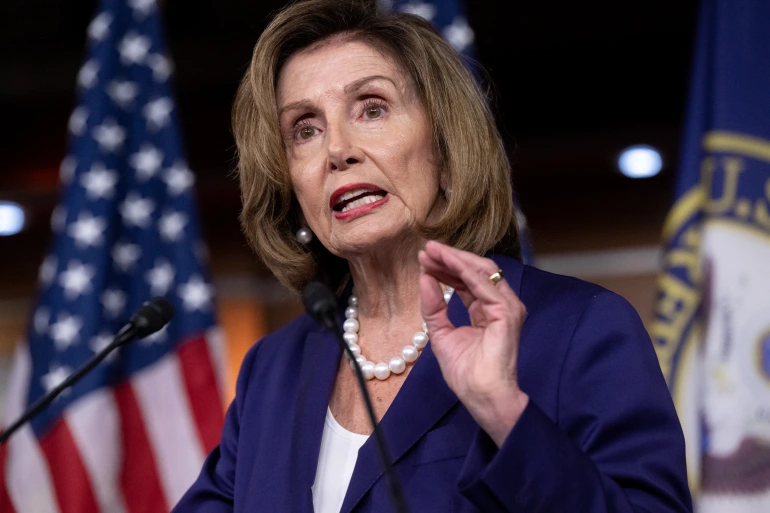
By Richard Javad Heydarian is a specialist in Asian geopolitical and economic affairs.




 World Opinions Débats De Société, Questions, Opinions et Tribunes.. La Voix Des Sans-Voix | Alternative Média
World Opinions Débats De Société, Questions, Opinions et Tribunes.. La Voix Des Sans-Voix | Alternative Média

